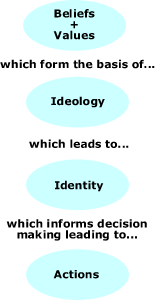Lesson 1 Citizenship
| Site: | MoodleHUB.ca 🍁 |
| Course: | Social 30-2 RVS |
| Book: | Lesson 1 Citizenship |
| Printed by: | Guest user |
| Date: | Wednesday, 31 December 2025, 9:24 PM |
1. Introduction
Citizenship and Ideology
Issue Question: To what extent should ideology shape your thinking and actions as a citizen?
- Exhibit a global consciousness with respect to the human condition and world issues
- Accept responsibilities associated with individual and collective citizenship
- Explore how ideologies shape individual and collective citizenship
- Examine perspectives on the rights, roles and responsibilities of the individual in a democratic society
Duration: 1 block (80 mins + homework)
In this lesson you will determine your course of action as a citizen in response to local, national and global issues, once you have identified your ideology and examined your answers to the three fundamental questions:
- What are humans like, and why do they act as they do?
- What is the nature of society?
- What is the role of the individual in society?
|
|---|
2
2. Lesson
Citizenship
"Democracy is the most demanding of all forms of government in terms of the energy, imagination, and public spirit required of the individual."
-George C. Marshall,
American 5-star general and 1953 Nobel Peace Prize Winner

| ||
As a citizen of a liberal democracy, knowing your rights is important. Equally important is taking seriously the responsibilities of your citizenship. In this lesson you will:
- learn the key vocabulary in unit 4
- reflect on your rights, roles and responsibilities as a citizen
Please go through this powerpoint to learn the key vocabulary in this unit.
Remember Unit 1 and the factors that shape an individual's identity:

When an individual translates beliefs and values into actions, some of those actions become that person's participation in society. A person's participation in society and the life of his or her nation translates into citizenship.

Have you ever wondered why individuals make different choices about citizenship? Why do some people seem uninterested in social issues and unprepared to become involved in influencing decisions, and others become excited and involved actively in these matters?
It is mainly due to a person's worldview and ideology.
|
3. Conclusion
Citizens in democratic societies can act on their feelings of what their rights, roles and responsibilities are in many different ways, depending on the situation and their ideological beliefs. For example, some demonstrate their respect for for law and order by joining citizens' groups, such as Citizens on Patrol. Some participate in the political process by voting, writing letters, or supporting a political party. Some support humanitarian causes by volunteering their time or raising funds. Some participate in civil disobedience by peacefully demonstrating or protesting to draw attention to an issue.